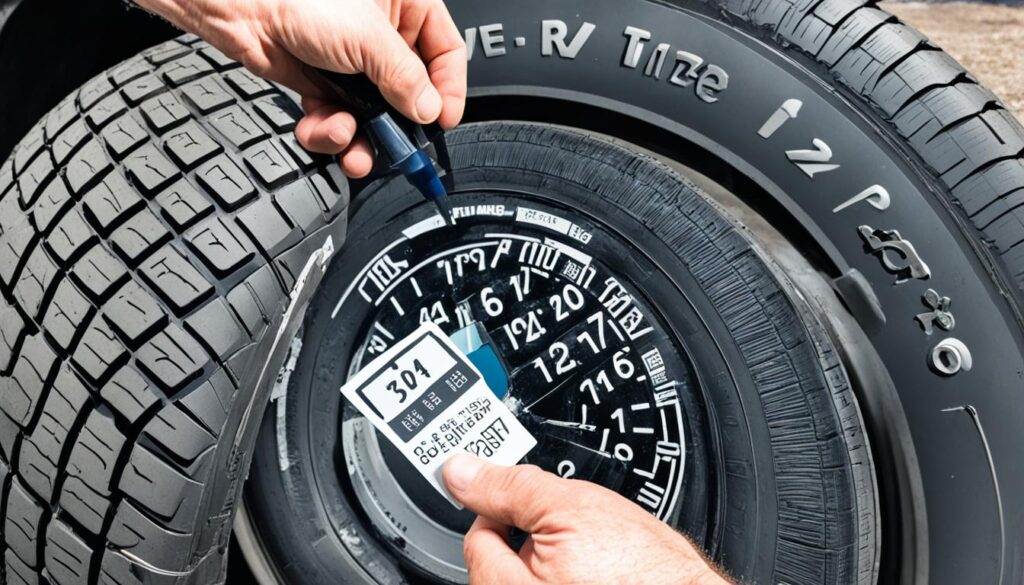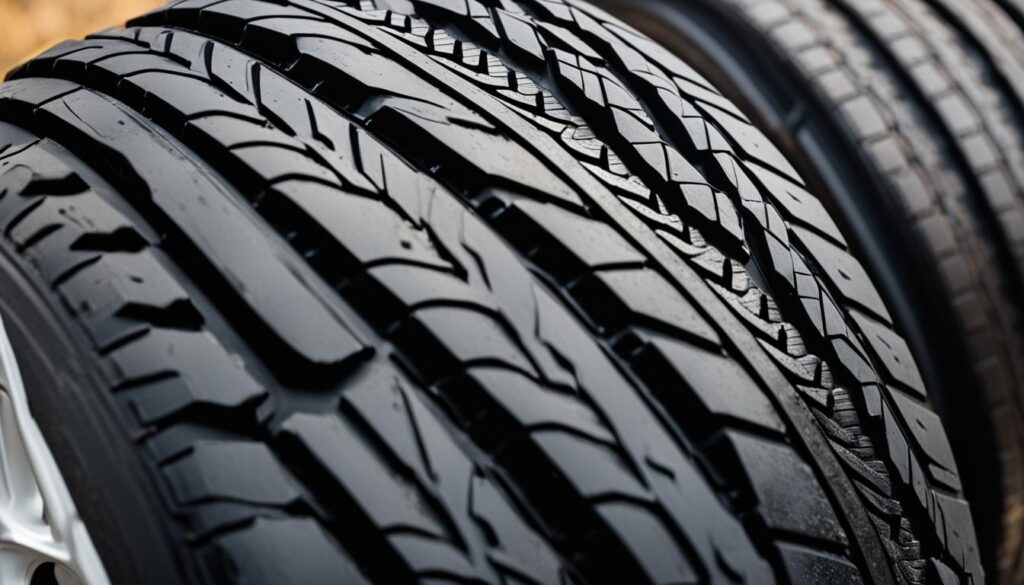Have you ever wondered how long your RV tires will last? Do you find yourself questioning if it’s time to replace them? The lifespan of RV tires can vary depending on several factors, from inflation and rotation to the type of terrain and driving conditions. But what is the average life of RV tires, and when should you consider replacing them? Let’s explore the key factors that affect the lifespan of your RV tires and uncover the answers to these important questions.
Key Takeaways:
- RV tires typically last from 3-6 years before needing replacement, with some top-notch products lasting up to 7-9 years.
- The lifespan of RV tires depends on factors like inflation, rotation, pressure monitoring, number of miles driven, type of terrain, and driving conditions.
- Off-road driving and heavy-duty hauling can significantly decrease the lifespan of RV tires, while driving fewer miles on good road conditions can extend their lifespan to 18-20 years.
Contents
How Old is Too Old for RV Tires?
When it comes to RV tires, understanding their lifespan is essential for both safety and performance on the road. While there is no exact expiration date for these tires, it’s crucial to know when it’s time to replace them. So, how old is too old for RV tires?
According to industry standards, the general recommendation is to replace RV tires every three to six years. However, it’s important to note that this timeline can vary based on several factors.
Tires age due to a combination of factors such as exposure to sunlight, heat, and the weight they bear. With time, the rubber compounds in tires deteriorate, causing them to lose their ability to maintain optimal shape and grip the road effectively. This deterioration can lead to an increased risk of blowouts and tread separation.
While tread depth is commonly used as a measure for tire wear, it’s not the sole indicator of tire condition. Even if your RV tires have sufficient tread, they should still be replaced if they have reached their recommended age limit. The age limit for RV tires is typically around six years, regardless of the frequency of use.
Replacing old RV tires is crucial for maintaining safety and reducing the risk of tire-related accidents. By adhering to the recommended age limit, you can ensure that your tires provide optimal performance and reliability on your RV journeys.
To determine the age of your RV tires, you can refer to the DOT code imprinted on the sidewall of each tire. The DOT code contains a series of numbers and letters that indicate the week and year of manufacture. Checking the DOT code can help you determine if your tires have exceeded their recommended age and need to be replaced.
Remember, even if your tires appear to be in good condition, the effects of aging can compromise their performance and safety. While it may seem like an additional expense, investing in new RV tires is an investment in your safety and peace of mind on the road.
Why Should You Replace RV Tires Every Few Years?
RV tires are subjected to the rigors of highway and off-road driving, as well as the weight and stress of the vehicle itself. This causes them to wear out faster than standard car tires. Regularly replacing RV tires every few years is important for several reasons.
- Loss of Strength and Grip: As tires age, they lose their strength and ability to hold up under pressure. This can lead to cracking, splitting, and a loss of grip when cornering or braking.
- Increased Risk of Blowouts: Aging tires are more susceptible to blowouts and tread separation, putting the vehicle and its occupants at risk. To ensure the safety of everyone on board, it is crucial to replace RV tires before they reach their expiration date.
By replacing RV tires every few years, you can maintain optimal performance and safety on the road. Regular tire maintenance and timely replacements are essential for enjoying worry-free travels and avoiding costly incidents caused by tire failure.
Expert Tip: Proper Tire Maintenance
“Regularly inspect your RV tires for signs of wear and tear, such as cracks, bulges, or visible damage. Check the tire pressure regularly and ensure it is in line with the manufacturer’s recommendations. Rotate the tires at regular intervals to ensure even tread wear. Taking these steps will help extend the lifespan of your RV tires and reduce the risk of tire-related issues on the road.”
– John Miller, RV Tire Expert
Remember, your RV tires play a crucial role in ensuring a safe and comfortable journey. By regularly monitoring their condition and replacing them as needed, you can enjoy worry-free travels and protect both your vehicle and its passengers.
Comparison of Standard Car Tires and RV Tires
| Factors | Standard Car Tires | RV Tires |
|---|---|---|
| Usage | Primarily on highways and urban roads | Highway and off-road driving |
| Stress and Weight | Lighter vehicles and lower stress | Heavier vehicles and higher stress |
| Lifespan | 6-8 years, depending on usage | 3-6 years, depending on usage |
| Grip and Stability | Optimized for cornering and braking | Designed to handle the weight and stress of RVs |
| Replacement Frequency | Less frequent | More frequent |
As seen in the table above, RV tires have specific characteristics and requirements due to the unique demands placed upon them. Understanding these differences can help you appreciate why regular tire replacements are crucial for RV owners.
Signs of Tire Deterioration and Potential Hazards
Deteriorating RV tires can exhibit signs that indicate they may no longer provide the necessary support and stability on the road. Regular inspection of your RV tires is crucial to identify signs of deterioration and avoid potential hazards. Ignoring these signs can lead to increased risks such as blowouts, loss of control, and reduced traction, compromising your safety during travels.
Signs of Deteriorating RV Tires
- Cracks: Check for visible cracks on the sidewall or tread of the tires. These cracks can weaken the tire structure and increase the chances of failure on the road.
- Bulges: Look for bulges or blisters on the tire surface. These bulges indicate weak spots that can rupture, leading to sudden tire failure.
- Visible Damage: Inspect for any visible damage, such as cuts, punctures, or uneven wear. These damages can compromise the integrity of the tire and affect its performance on the road.
It’s important to note that these signs of deterioration can occur even if the tire has sufficient tread depth remaining. Therefore, regular visual inspection is essential to catch any potential issues with your RV tires.
Potential Hazards of Old RV Tires
Driving on deteriorated RV tires poses significant hazards that can endanger you and your passengers on the road. These hazards include:
- Blowouts: Deteriorated tires are more prone to sudden blowouts, leading to loss of control and potential accidents.
- Loss of Control: Tires with reduced grip and stability can result in decreased control while cornering, braking, or navigating challenging road conditions.
- Reduced Traction: Worn-out tires have compromised traction, especially in wet or slippery conditions, increasing the risk of skidding or hydroplaning.
To ensure safe travels and minimize the risk of tire-related incidents, it is crucial to promptly address any signs of tire deterioration by replacing them with new, reliable RV tires.
Regular tire inspections are essential to identify signs of deterioration and potential hazards.
How to Determine the Age of RV Tires
The age of RV tires is a critical factor in ensuring the safety and performance of your recreational vehicle. To determine the age of your RV tires, you can refer to the Department of Transportation (DOT) code imprinted on the sidewall of each tire.
The DOT code consists of a unique combination of numbers and letters, with the first two numbers representing the week of manufacture and the final two digits indicating the year of manufacture. For example, a tire marked with “1621” would indicate that it was manufactured in the 16th week of the year 2021.
Determining the age of your RV tires is essential, regardless of their remaining tread depth. Tires may still exhibit good tread but can deteriorate over time due to various factors such as exposure to sunlight, fluctuations in temperature, and the aging of rubber compounds. Therefore, it is crucial to consider the age of your RV tires when evaluating their overall condition and determining if replacement is necessary.
Regularly replacing aging RV tires is vital for maintaining optimal safety on the road. Even if your tires have excellent tread, the structural integrity and ability to grip the road may be compromised. Old tires are more prone to blowouts, tread separation, and loss of control, which can lead to dangerous situations, especially when towing a heavy RV.
By inspecting the DOT code and determining the age of your RV tires, you can make informed decisions about their replacement and ensure a safer and more enjoyable travel experience.
Why Age Matters
Understanding the age of your RV tires is crucial because it plays a significant role in their overall performance and safety. As tires age, the rubber compounds harden, leading to reduced flexibility and traction. This can significantly impact your ability to control the vehicle, especially in emergency situations or adverse weather conditions.
Furthermore, the structural integrity of aging tires can become compromised, making them more susceptible to tire blowouts, tread separation, and rapid deflation. These issues can potentially lead to loss of control, accidents, and costly damage to your RV.
Ultimately, regular tire inspections, including checking the age of your RV tires, are essential for maintaining the safety and longevity of your recreational vehicle. Prioritizing tire maintenance and replacement ensures that you can travel with peace of mind, knowing that your tires are in optimal condition and capable of handling the challenges of the road.
Looking to the future, Section 6 of this article will provide valuable maintenance tips to help you prolong the lifespan of your RV tires and maximize your on-road safety.

RV Tire Maintenance Tips
Regular maintenance is crucial for maintaining the longevity and performance of your RV tires. By following these essential maintenance tips, you can ensure that your tires are in optimal condition and minimize the risk of tire-related issues on the road.
- Check tire pressure regularly: Underinflated tires can lead to damage and reduced performance. Use a tire pressure gauge to check the pressure and inflate or deflate as needed to match the manufacturer’s recommendations.
- Rotate tires every 5,000 miles: Regular tire rotation helps ensure even tread wear and can prevent blowouts. Follow the recommended rotation pattern specified in your RV’s owner’s manual.
- Avoid overloading your RV: Excessive weight puts strain on your tires, increasing the risk of tire failure. Be mindful of the weight limits specified for your RV and avoid exceeding them.
- Use water-based tire products for cleaning: When cleaning your RV tires, opt for water-based tire cleaning products. These products help prevent drying out and cracking of the tire rubber.
Remember, proper tire maintenance is essential for your safety and the longevity of your RV tires. By incorporating these maintenance tips into your routine, you can enjoy worry-free travels and prolong the lifespan of your tires.
Expert Tip:
I highly recommend scheduling regular inspections and maintenance with a professional RV tire service provider. They have the expertise to assess the condition of your tires, detect any potential issues, and perform necessary repairs or replacements. Don’t overlook the importance of professional care for your RV tires, as it can greatly contribute to your overall safety on the road.
| Benefits of Regular RV Tire Maintenance | Actions to Take |
|---|---|
| Increased safety on the road | Check tire pressure regularly, rotate tires every 5,000 miles, and avoid overloading your RV. |
| Improved tire performance and longevity | Use water-based tire products for cleaning and follow manufacturer-recommended maintenance schedules. |
| Reduced risk of tire-related issues | Schedule regular inspections and maintenance with a professional RV tire service provider. |
Choosing the Right RV Tires
Selecting the right RV tires is essential for ensuring optimal performance and safety on the road. When choosing RV tires, there are several factors to consider that can greatly impact your travel experience. These factors include load capacity, speed ratings, and the type of terrain you will encounter.
Every RV has specific weight requirements, and it is crucial to choose tires that can handle the weight of your vehicle, passengers, and equipment. Overloading your RV can put excessive strain on the tires, leading to inefficiencies and potential safety hazards. Considering load capacity when selecting RV tires guarantees that your tires can support the weight and maintain stability throughout your journey.
Another important factor to consider is the speed rating of the tires. The speed rating indicates the maximum speed at which the tires can safely operate. It is essential to choose RV tires with a speed rating that aligns with your travel preferences and adheres to legal requirements. Keep in mind that higher speed ratings often correlate with enhanced performance characteristics.
The type of terrain you plan to navigate is also a critical factor to consider when choosing RV tires. Different types of tires, such as radial or bias, offer varying levels of traction, durability, and handling capabilities. Radial tires are known for their superior performance on highways, while bias tires offer excellent off-road capabilities. Evaluate your travel preferences and the specific needs of your RV to determine the most suitable tire type for your adventures.
Investing in high-quality and durable tires that align with your RV’s specifications is a wise decision. This ensures a smooth and safe travel experience, minimizes the risk of tire-related issues, and maximizes the lifespan of your RV tires.
Tire Selection Checklist:
- Consider the load capacity required for your specific RV.
- Choose RV tires with a speed rating that meets your travel preferences and legal requirements.
- Assess the type of terrain you will encounter and choose the appropriate tire type.
- Invest in high-quality, durable tires that align with your RV’s specifications.
By following this tire selection checklist, you can confidently choose the best RV tires for your adventure, ensuring a safe and enjoyable journey.

Expert RV Tire Replacement and Servicing
When it comes to replacing your RV tires, it’s crucial to seek professional help to ensure a proper installation and alignment. At Crossroads Trailer Sales in Newfield, New Jersey, we offer expert RV tire service provided by our experienced technicians. We understand the importance of your RV’s safety and performance on the road, which is why we provide comprehensive inspections of your existing tires.
Our knowledgeable technicians will conduct a thorough assessment of your RV tires and provide expert recommendations based on your RV’s specifications. We have a wide selection of high-quality RV tires from trusted brands, ensuring that we can find the perfect fit for your vehicle. With our expertise and experience, we guarantee that your new RV tires will be mounted, balanced, and aligned correctly, maximizing their performance and your peace of mind.
At Crossroads Trailer Sales, we pride ourselves on delivering top-notch RV tire replacement and servicing. Our goal is to keep your RV’s tires in optimal condition, ensuring your safety and satisfaction on the road. When it’s time for a tire replacement, trust in our professional RV tire service to provide the expertise and quality you deserve.
FAQ
How long do RV tires typically last?
RV tires generally last from 3 to 6 years before they need to be replaced. Factors such as inflation, rotation, and pressure monitoring can affect the lifespan of RV tires.
How old is too old for RV tires?
The age limit for RV tires is typically six years, regardless of usage frequency. It is important to replace RV tires once they reach their recommended age, even if there is still tread left.
Why should you replace RV tires every few years?
Replacing RV tires every few years is important to maintain safety and performance. As tires age, they lose their strength, grip, and ability to hold up under pressure, increasing the risk of blowouts and tread separation.
What are the signs of tire deterioration and potential hazards?
Signs of deteriorating RV tires include cracks, bulges, and visible damage. Driving on deteriorated tires can lead to hazards such as blowouts, loss of control, and reduced traction.
How can you determine the age of RV tires?
The age of RV tires can be determined by checking the DOT code on the sidewall of each tire. The DOT code provides information about the week and year of manufacture.
What are some RV tire maintenance tips?
To prolong the lifespan of RV tires, regularly check tire pressure, rotate tires every 5,000 miles, avoid overloading the RV with excess weight, and use water-based tire products for cleaning.
How do you choose the right RV tires?
When choosing RV tires, consider factors such as load capacity, speed ratings, and the type of terrain you will encounter. Select tires that can handle the weight of your RV and meet your specific travel needs.
Where can you find expert RV tire replacement and servicing?
Crossroads Trailer Sales in Newfield, New Jersey, offers a range of comprehensive services for RV tire replacement and servicing. Professional RV tire service technicians can provide expert recommendations and ensure proper installation and alignment of new RV tires.






